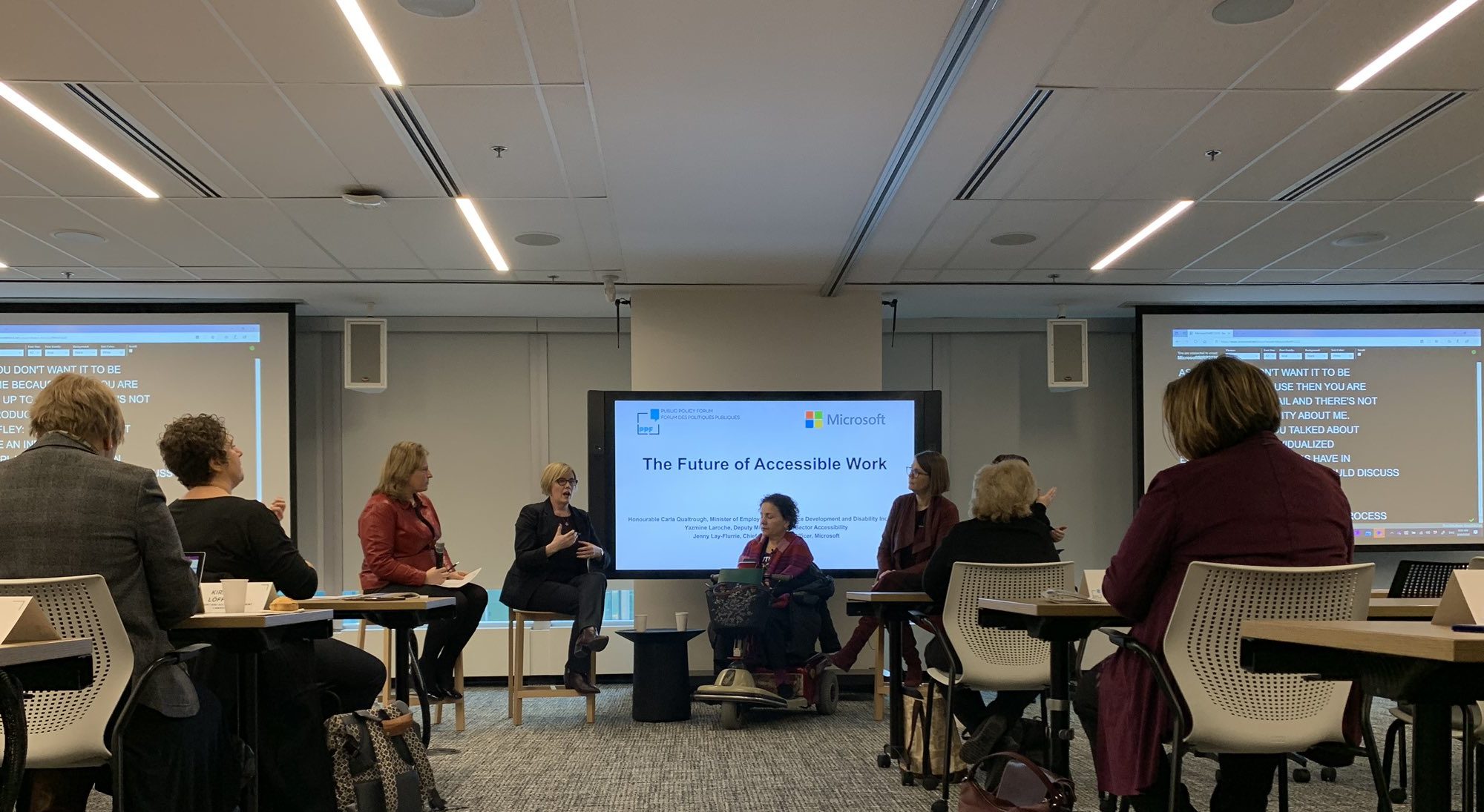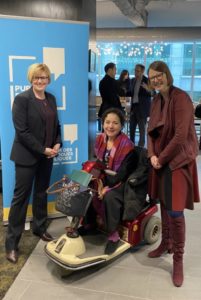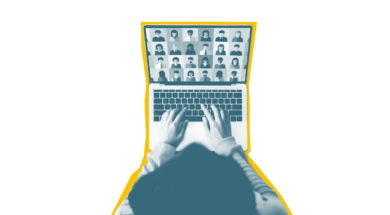
It’s not a problem we need to solve, it’s really about good management
5 Key Takeaways from PPF’s ‘Future of Accessible Work’ PanelThe imperative to make work more accessible is one the Public Policy Forum is delving into deeply. As the world of work continuously shifts, modernizes and innovates, what moves can be made to get and stay ahead?

Last Friday, PPF co-hosted The Future of Accessible Work panel discussion with Microsoft Canada as part of our broader Brave New Work (BNW) Initiative. BNW brings together government, employers, education providers, individuals, and labour groups to explore how jobs and industries are impacted by technological advancement and how these shifts present myriad opportunities. It was through this lens that PPF and Microsoft designed a Future of Accessible Work panel discussion featuring national and international accessibility leaders & advocates including The Honourable Carla Qualtrough, Minister of Employment, Workforce Development and Disability Inclusion, Jenny Lay-Flurrie, Chief Accessibility Officer at Microsoft, Yazmine LaRoche, Deputy Minister of Public Service Accessibility, and PPF’s Julie Cafley, Executive Vice-President of External Relations.
The purpose of this speaker series was for PPF members to learn about accessibility and inclusion straight from the experts. The hope is that through learning, we better our accessible processes, eliminate barriers, and encourage other organizations to do the same.
PPF welcomed over 80 guests and members, which reflected a multi-sectoral presence to ensure that together we could envision accessible and inclusive employment. Our panelists discussed their personal and lived experiences, emergent technologies, policy improvements around accessibility, and cutting-edge inclusion strategies. The panelists emphasized the need to shift from a reactive model of accessibility to a proactive human rights-based model to remove barriers created by society. Disability is not a problem to be solved in the workplace, rather, the focus needs to be on creating an environment where employees feel confident communicating their accommodation needs so they can be productive and make their best contribution to the organization. Through sharing their lived experiences and personalizing the discussion, the panelists brought a concrete reality to what many think of in the realm of abstraction.
Many thanks to our panelists, valued members and guests for sharing insightful ideas and the incredible energy in the room. We would also like to thank Microsoft Canada for hosting this session. To keep the conversation going and share our lessons learned, we have encapsulated five significant takeaways from the discussion:
- 22% of Canadians are living with one or more disabilities: The personal experiences shared by our panelists are representative of the lived experiences of millions of people around the world. As explained by Minister Qualtrough, disabled people are still a minority that we discriminate against by not ensuring that we build things accessible from the start. In order to remove barriers, we need to engage the people facing them. As Deputy Minister Yazmine Laroche said, “nothing without us because everything is about us.”
- Accessibility and inclusion are a business imperative in 2020: Deputy Minister Yazmine Laroche explained that we perceive accessibility as a problem we need to solve, when it is really about good management. Leaders are tasked with ensuring all employees have everything needed to make their best contribution. Jenny Lay-Flurrie, Chief Accessibility Officer at Microsoft, shared a value Microsoft etched on the office walls, which reads, “If leaders are not intentionally creating cultures of inclusion, then by default, they are creating cultures of exclusion.” Words to live by.
- We need to keep building a systemic culture around accessibility: Inclusive and aspirational discussions about accessibility lead to an environment where employees feel comfortable disclosing their disabilities and requesting accommodations. Employers must create a culture that encourages people to self-identify confidently, knowing there will be a benefit in doing so.
- Employers need to develop “disability confidence” through education and training: A sophisticated, thoughtful employer engages the best talent by removing the barriers that impede identifying, hiring and retaining them. Disability confidence can lead to employee confidence. This can begin with the simple question, “How can I help you make your best contribution?”
- The Canadian Public Service will lead by example: The Canadian Public Service is working toward a workplace that is highly productive and one where people can contribute their best. Minister Qualtrough shared that The Accessible Canada Act was born of unprecedented national consultation about disabilities, one that was inclusive and accessible by design. What emerged was a clear message: Canada needs to remove barriers and encourage inclusion. Today, all federal bodies are needing to strategize a multi-year accessibility plan to identify, prevent, and remove barriers for all employees according to the Accessible Canada Act legislation.
With all this in mind, PPF wants to hear your corporate journey toward accessibility, best practices, and proactive policies for creating welcoming, safe and productive workplaces for your employees. We invite you to the Brave New Work conference on June 16, 2020, in Toronto featuring national employment leaders.





